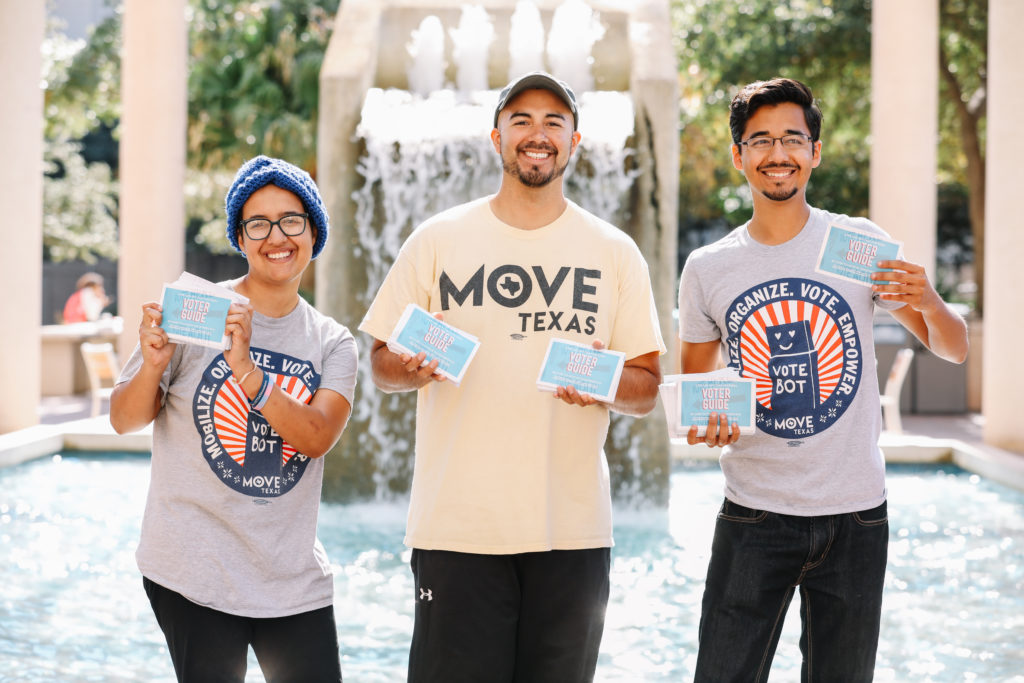With more than 10% of Bexar County’s population aged 18-24 and nearly 30% aged 25-44, MOVE Texas understands the importance of increasing the youth vote and bringing new voices into the electoral process. The group registered 5,581 voters in Bexar County in 2017, accounting for 41% of new voters, with only two full-time employees. In 2018, they not only ramped up their registration efforts, they ramped up their fundraising efforts, hired 35 employees, and went statewide. This past election, the group helped register 30,000 new voters across Texas, making them the largest and most effective voter registration group in the state and one of the best in the nation.
At the foundation of their work is a look back to understand the legacy of voter suppression. MOVE orientation requires all new employees, interns, and fellows to take a literacy test that was given to Black Louisiana voters in 1964. It is three pages long, and people have five minutes to take it. Ninety-five percent of new employees fail the test, Executive Director H. Drew Galloway said. “It shows them that if they were in their grandparents’ shoes, they wouldn’t be able to vote and so when they look at voter laws today and voter registration, they look at it through that lens.” Understanding historical voter suppression, in other words, helps us understand the barriers that persist today.
At campuses like St. Mary’s University, for example, where students have to walk across four lanes of traffic to get to the closest polling site, MOVE organizes a student voting march so students walk across safely together and make a statement. “It shows them that you can comply with the law, but innovate as well,” said Drew. Since starting its work, MOVE has added early voting sites at San Antonio College, Palo Alto College, the University of Texas at San Antonio, and Northwest Vista College. Before MOVE began petitioning school leaders to make it easier for students to vote, there were none.

Frankie Trynoski at UTSA | Photo by Vanessa Velazquez
Last November, the youth-led organization worked with the Texas Civil Rights Project to extend early voting days and add an election day voting site at Texas State University, winning a highly publicized victory in Hays County. The campus polling site was only open for three days during early voting. With a student population close to 40,000 and MOVE churning out registered voters, students were waiting in line for more than two hours. “We were having issues with keeping people in line because they had to go to the restroom and didn’t want to lose their spot,” Drew said. Every few hours, MOVE volunteers delivered pizza to those waiting in line.
Saffron “Saffie” Kaplan, a field fellow who is responsible for block walking and phone banking, has learned that “it really takes small inconveniences” to keep people from voting, so part of her job is to meet people where they are, make registration easy, and engage people in a nonpartisan way.
Meeting people where they are extends to MOVE staff as well. Saffie is working at MOVE during her college gap year. Energetic and bubbly, she was surprised to find a job as an eighteen-year-old that aligns with her values and serves the community. Similarly, Frankie Trynoski, a field organizer, said he loves that MOVE has leadership development embedded into its model. Fellows and interns learn how to problem solve and effectively communicate, regularly addressing government and political science classes with close to 250 students. “We’re invested in the person as much as the person is invested in the organization,” he says with a smile.
Drew sees the impact of this trust-building culture: “I think we’re having a massive impact because students are trusting us, because we are trusted messengers and are nonpartisan,” Drew said.

